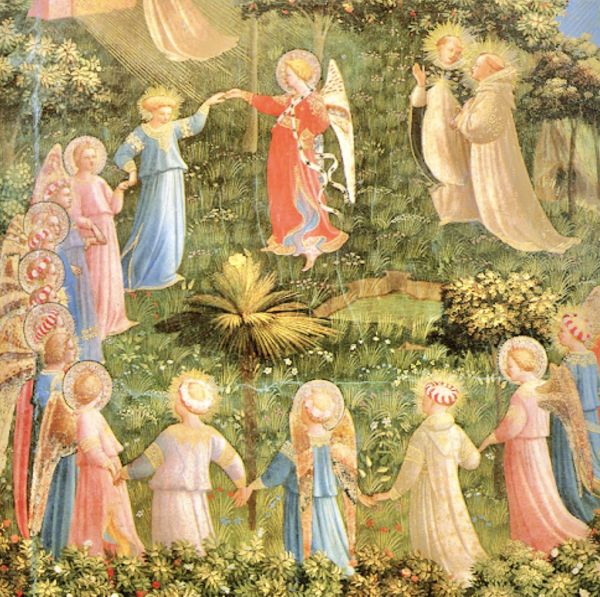In the Gospel of Luke, the Beatitudes are contrasted with the "Woe" that the Lord pronounces towards the full of this world.
We dwell on the Beatitudes.
Jesus proclaims in them the love of God for every man, especially for the poor, the object of his predilection.
Francis looked upon the Beatitudes as a portrait of Christ and followed them because he was in love with Him.
He had great veneration not only for the Virgin Mary but also for all the saints.
Indeed, among his writings is an antiphon recited every hour:
"Holy Virgin Mary, there is none like thee, born in the world, among women, daughter and handmaid of the Most High and Supreme King the heavenly Father, mother of our most holy Lord Jesus Christ, spouse of the Holy Spirit; pray for us with Saint Michael the Archangel and with all the powers of heaven and with all the saints, to thy most holy beloved Son, Lord and Master. Glory be to the Father. As it was." (FF 281).
The Sources underline that "the saints and their memory were for him like burning coals of fire, which revived in him the deifying fire" (FF 1167).
In the Admonitions of Francis we read:
"Blessed are the poor in spirit, for theirs is the kingdom of heaven.
There are many who persistently apply themselves to prayers and occupations, do many abstinences and corporal mortifications, but for a single word that seems an insult to their person, or for something that is taken away from them, scandalised, they quickly become irritated.
These are not poor in spirit, for he who is truly poor in spirit hates himself and loves those who strike them in the cheek" (FF 163).
"Blessed are the peacemakers, for they shall be called children of God".
"True peacemakers are those who in all the anxieties they endure in this world, for the love of our Lord Jesus Christ, keep peace in soul and body" (FF 164).
But in the same Canticle of Brother Sun, when he was very ill, he added the famous verse of forgiveness:
"Be praised, my Lord/ for those who, out of love for you, forgive/ and sustain infirmity and tribulation./
Blessed are those who will stand in peace,/ and by you, Most High, be crowned" (FF 1593).
Nevertheless, Clare of Assisi, in her wonderful Blessing to the sisters, turns her gaze to the whole assembly of saints in heaven and on earth:
"I pray to our Lord Jesus Christ through his mercy and through the Intercession of his most holy Mother Mary, of the blessed Archangel Michael and all the holy Angels of God, [of our blessed Father Francis] and of all the saints and holy women of God, that the same heavenly Father may bestow upon you and confirm this most holy blessing in heaven and on earth: on earth, multiplying you, by his Grace and virtues, among his servants in his Church militant; in heaven, exalting and glorifying you in his Church triumphant among his saints and holy ones" (FF 2855).
Clear beauty of a communion lived in the round with the Blessed who still walk the earth and with those who wave their palms before the throne of the Lamb in the heavenly Jerusalem.
«Blessed are the poor, for yours is the kingdom of God» (Lk 6:20b)
Wednesday of the 23rd wk. in O.T. (Lk 6:20-26)












